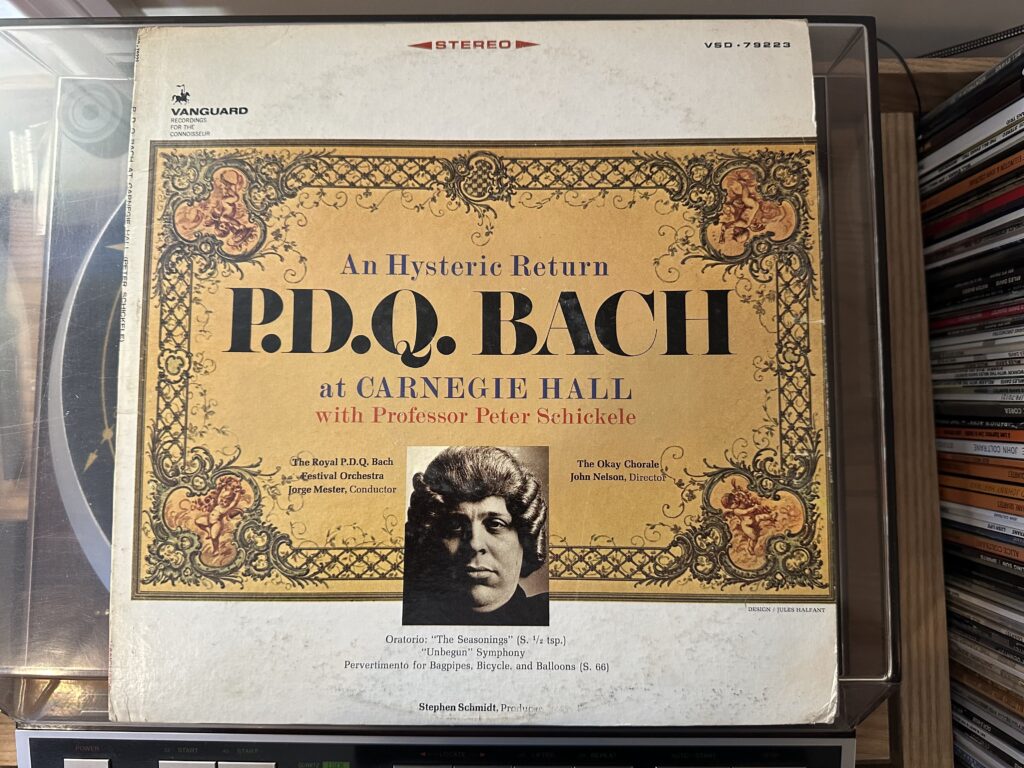
Bonus Album of the Week, week of February 3, 2024
When I last wrote about Peter Schickele and P.D.Q. Bach, I didn’t write very much about the music. It’s hard to write about funny stuff, it turns out! And P.D.Q. Bach was solidly in that camp; as Schickele once said, where other composers wrote in the musica seria tradition, P.D.Q. Bach wrote in the musica funnia. This album proves that, maybe even more dramatically than the debut record.
Schickele (born in 1935) had been writing parodic music in the Baroque vein since he was a teenager; his earliest work, the “Sanka” Cantata, was recorded with his brother David in 1954, when he was just 19. The first P.D.Q. Bach concert recording, reviewed last week, happened when Schickele was 30, at which point a good part of the musical identity of the composer had been established: familiar or familiar-sounding themes, upended by comic settings that never quite seemed to do the expected thing, or by the equivalent of orchestral slapstick (deliberately wrong notes, jarring chords, the orchestra losing its place), or by some of the many unique instruments that Schickele invented: the tromboon, the double-reed slide music stand, the windbreaker. There was even the omnipresent “bargain counter tenor,” John Ferrante.
But for my money, P.D.Q. Bach didn’t become legendary until the publication of his first works for chorus. That may be because the P.D.Q. album my family owned, A Portrait of P.D.Q. Bach, begins and ends with choral works (the “Missa Hilarious” and “A Consort of Choral Christmas Carols”). Or it may be because the additional dimension of demented libretti causes ganglions in the left brain to giggle. Whatever the reason, the arrival of the Okay Chorale on the first track of An Hysteric Return is cause for rejoicing.
The chorus is here to perform P.D.Q.’s oratorio The Seasonings (S. 1/2 tsp.). Like the cantata “Iphigenia in Brooklyn” from the debut album, the oratorio features John Ferrante, whose recitatives set up the plot, such as it is, of the oratorio, and drive the encounters with soloists Lorna Haywood, Marlena Kleinman and William Woolf. The oratorio is full of groaning puns that are the equivalent of baroque “dad jokes” — “Open sesame seeds,” “Bide thy thyme,” “Tarragon of virtue it is full.” But the chorus steals the show on the slow movement “By the leeks of Babylon” and in the finale, “To curry favor, favor curry.”
As on the first album, Schickele takes the opportunity to “slip a little something of my own on… which I also wrote,” and as with his Quodlibet, the “Unbegun” Symphony is a collection of famous themes, expertly woven together in indescribably funny ways. To this day, I can’t hear the theme of Brahms’ second symphony without overlaying “Beautiful Dreamer” on it… or expecting it to segue into “Ta-ra-ra-boom-de-ay.”
The concert concludes with the “Pervertimento for Bagpipes, Bicycle and Balloons” (S. 66), a work which substantially expands the concert repertoire for bagpipes while attempting to establish the bicycle (here used to power a siren—the faster the performer pedals, the higher the pitch) or the balloons as viable solo instruments, an effort that is a complete and utter failure. As comedy instruments, though, they’re pure gold, and the ending, featuring three balloons exhausting their air through pitch pipes in a major chord, is worth the price of admission over and over again.
With An Hysteric Return, Schickele established that P.D.Q.’s hilarity wasn’t just an interesting accident, but a formula that could reliably deliver laugh after laugh. He went on to prove this in a series of nine additional albums for Vanguard records, some of which were absolutely hysterical (see: Portrait of P.D.Q. Bach) and some of which were less so (for my money, Music You Can’t Get Out of Your Head risks riding the joke too long). But he still had enough gas in the tank for at least one more masterpiece, and we’ll hear it the next time this bonus feature returns.
You can listen to this album here:
